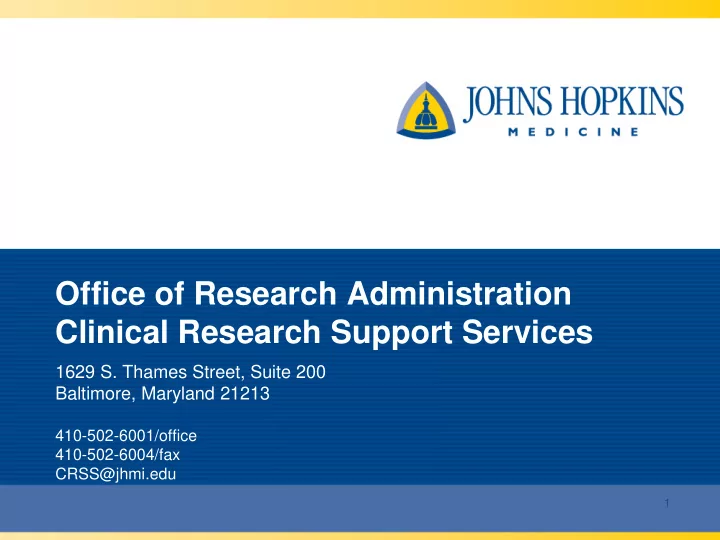

Office of Research Administration Clinical Research Support Services 1629 S. Thames Street, Suite 200 Baltimore, Maryland 21213 410-502-6001/office 410-502-6004/fax CRSS@jhmi.edu 1
Office Organization Director: Clinical Research Coverage Analysts: Karen Roz, MS Mario Adrien Erika Maden Gailunas Assistant Director: Genea Smith Lisa Wallace MT ASCP Linda Wilkins Leslie Woytowitz Sr. Clinical Research Coverage Analysts: Dawn Young Cindy Elliott Tracy McCracken RN BSN Administrative Assistant Chelsea Single Budget Specialist: Kelly Crowe 2
Office of Research Administration Clinical Research Support Services • Primary Function – Prospective Reimbursement Analysis • Multiple Secondary Functions – Study Budgeting – Initiate JHH Research Account through Patient Financial Services (PFS) – Patient Financial Responsibility Sheet – Clinical Research Insurance Clearance determination – Etc. etc. etc… 3
Prospective Reimbursement Analysis (PRA) • Complex process • Simultaneous with – IRB review – Contract negotiations • Constantly changing – Changes to regulations/coverages/care standards – Changes in institutional processes 4
5
Prospective Reimbursement Analysis (PRA) Conventional Care Standard • National Guideline Clearing House • American College of Cardiology • American College of Radiology • National Comprehensive Cancer Network (NCCN) Items and Services • Standard of Care • Research • Free • Non-billable Additional Comments 6
Prospective Reimbursement Analysis (PRA) Schema • Can be very simple or very complex • Details participant timeline • Details items/services described in protocol • Details location where items/services are expected to be provided • Delineates reimbursement analysis (i.e. Standard of Care vs. Research vs. Free vs. Non-billable) • May include extensive footnotes 7
Prospective Reimbursement Analysis (PRA) Further Study Draft PRA Final PRA Actions • EPIC form • IRB Approval • Revised • Draft Budget (if • Funding Awarded accordingly requested) • Insurance • PRA used for Clearance status charge • Patient Financial adjudication is Responsibility the one in effect Sheet at the time of • EPIC Activation participant • CRMS consent 8
Prospective Reimbursement Analysis (PRA) • Summary – The PRA is the internal tool developed to document how each study meets the NCD criteria for billing routine costs to Medicare. – A systematic review of clinical trial related documents to determine the billing status of items and services that are documented within the research protocol – A method for ensuring that all the documents pertaining to a research protocol are consistent with each other 9
Budget Development and Negotiations 10
Budget Development • Concurrent with PRA development • How CRSS can help: – Identify “hidden” costs – Identify and document “routine” vs. “research” – Provide completed budget template – Negotiate with your sponsor 11
Budget Development • Study Team must: – Provide salary information – Identify amount of effort for all personnel – Identify cost amounts (i.e. cost of special labs, radiology procedures) – Maintain timely communication with CRSS – Process proposal through standard methods 12
Budget Negotiations • Service offered by CRSS • Benefits – Maintain rapport with sponsor – Removed from “business” aspect of research – Institutional backing • By request only – Some PIs prefer to be “hands-on” with the negotiation process 13
Clinical Research Revenue Cycle Clinical Research is an integral part of the Johns Hopkins mission statement. In order to participate fully and completely in clinical research at Johns Hopkins, it is vital to understand the financial as well as the regulatory and clinical aspects of clinical research. The Clinical Research Revenue Cycle encompasses the search for and receipt of funding, whether commercial or non-commercial; appropriate budgeting and management of those funds; and, maintaining compliance with regulations guiding the use of those funds and ensuring that our patients are fully- informed as to what costs they are responsible for as well as what the sponsor is covering as part of the research. This interactive learning session brings together six offices involved in the Clinical Research Revenue Cycle at Johns Hopkins and will provide you with information on what are the responsibilities of the Prinicipal Investigator and other study team members in regards to the Clinical Research Revenue Cycle at Johns Hopkins. There are many tools and resources available to assist with this process and this learning session will introduce you to all of them as well as provide you with a network of people that can assist you as you 14 initiate and manage your research activities.
Clinical Research Revenue Cycle My Learning Course Catalog Compliance Research Compliance and Ethics Clinical Research Billing Orientation (CRBO) online Clinical Research Management Systems (CRMS) online Clinical Research Revenue Cycle (CRBO & CRMS must be completed prior to CRRC) 15
Questions? Thank you 16
Recommend
More recommend